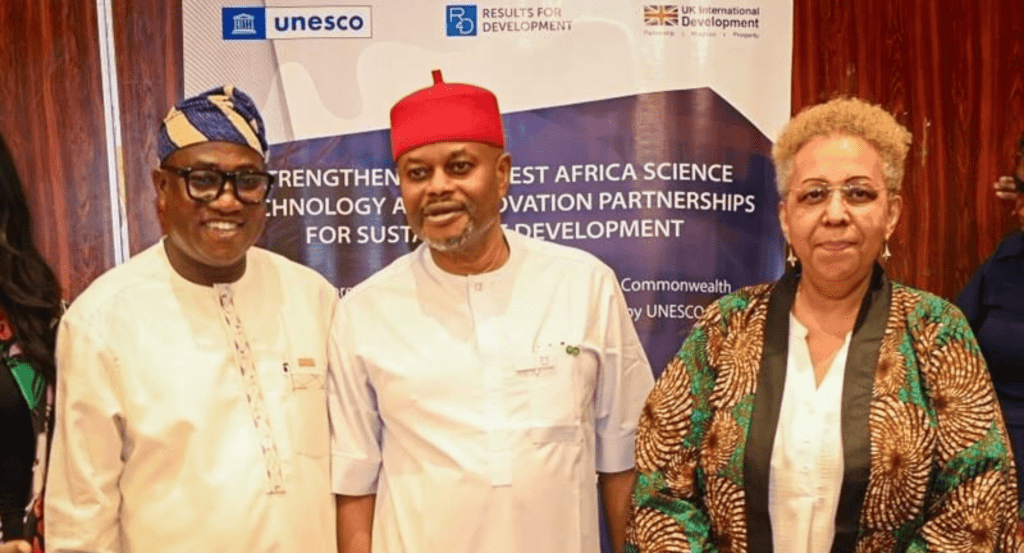Sankore Initiative Launched to Drive Innovation in West Africa
The UK Foreign, Commonwealth & Development Office (FCDO), Nigeria’s Federal Ministry of Innovation, Science & Technology (FMIST), and Ghana’s Ministry of Environment, Science & Technology (MEST) have jointly introduced the Sankore Initiative—a £1.9 million project designed to advance science, technology, and innovation (ST&I) across West Africa.
As part of the UK-Africa Technology and Innovation Partnerships (ATIP), this initiative aims to strengthen collaboration between the UK, Nigeria, and Ghana while reinforcing major agreements such as the UK-Ghana ST&I Strategy (2023-2027) and the UK-Nigeria Strategic Partnership, signed in November 2024.
Key Focus Areas of the Sankore Initiative
According to a statement from the UK Foreign, Commonwealth & Development Office (FCDO), the Sankore Initiative will focus on:
-
Supporting research funding: Enhancing Ghana’s National Research Fund (GNRF) and Nigeria’s National Research Fund (NRF) to boost local scientific advancements.
-
Establishing Nigeria’s National Research and Innovation Council (NRIC) to drive homegrown innovation.
-
Encouraging commercialization of cutting-edge solutions in agriculture, energy, and other key sectors.
-
Improving policies and regulations for innovation, ensuring better data access for businesses and researchers.
-
Creating a Helpdesk to provide technical guidance to governments, innovators, and businesses.
Leaders from the UK, Nigeria, and Ghana Applaud the Initiative
At the official launch in Abuja, government officials and stakeholders emphasized the initiative’s transformative potential.
Ms. Susan Mshana, UK’s Head of Integrated Strategy and Delivery Unit, highlighted the importance of the Sankore Initiative in strengthening UK-West Africa relations:
“Sankore will strengthen the UK’s long-term partnership with West Africa, driving economic growth through innovation. By combining our expertise, we aim to boost job creation, economic diversification, and service delivery in Nigeria and Ghana.”
Ghana’s Minister of Environment, Science & Technology, Dr. Ibrahim Murtala Muhammed, emphasized the initiative’s role in positioning Ghana as a regional leader in scientific and technological development:
“Innovation is key to building a strong economy, and Sankore will help Ghana advance its research and technology ecosystem.”
Similarly, Nigeria’s Minister of Science, Technology & Innovation, Chief Uche Geoffrey Nnaji, underscored the initiative’s alignment with Nigeria’s technology-driven economic vision:
“Sankore aligns with our goal of promoting homegrown innovation while integrating global advancements. This partnership with the UK will accelerate Nigeria’s tech-driven economic progress.”
DON’T MISS THIS: Flutterwave Expands in Ghana with Pay With Bank Transfer Integration
Sankore Initiative Implementation and Timeline
The Sankore Initiative will be executed by UNESCO and Results for Development (R4D) in collaboration with national and international partners. The project will run for 15 months, concluding in March 2026.
UNESCO, through its Multisectoral Regional Office for West Africa in Dakar, Senegal, and national offices in Abuja and Accra, will partner with organizations such as the UK Centre for Ecology and Hydrology (UKCEH) to reinforce national ST&I systems.
The initiative is expected to support Nigeria’s and Ghana’s development priorities, promote scientific research, and foster sustainable economic growth through technological advancement.
DON’T MISS THIS:
Why the Sankore Initiative Matters
Africa’s tech and innovation ecosystem is expanding rapidly, and the Sankore Initiative presents a strategic opportunity for Nigeria and Ghana to leverage research, innovation, and policy reforms for economic transformation.
By strengthening research funding, improving commercialization of innovations, and enhancing policy frameworks, the initiative will unlock new opportunities for startups, researchers, and investors in West Africa.
With technology at the heart of economic progress, Sankore has the potential to shape the future of science, technology, and innovation in the region, ensuring that Nigeria and Ghana remain competitive in the global economy.





















